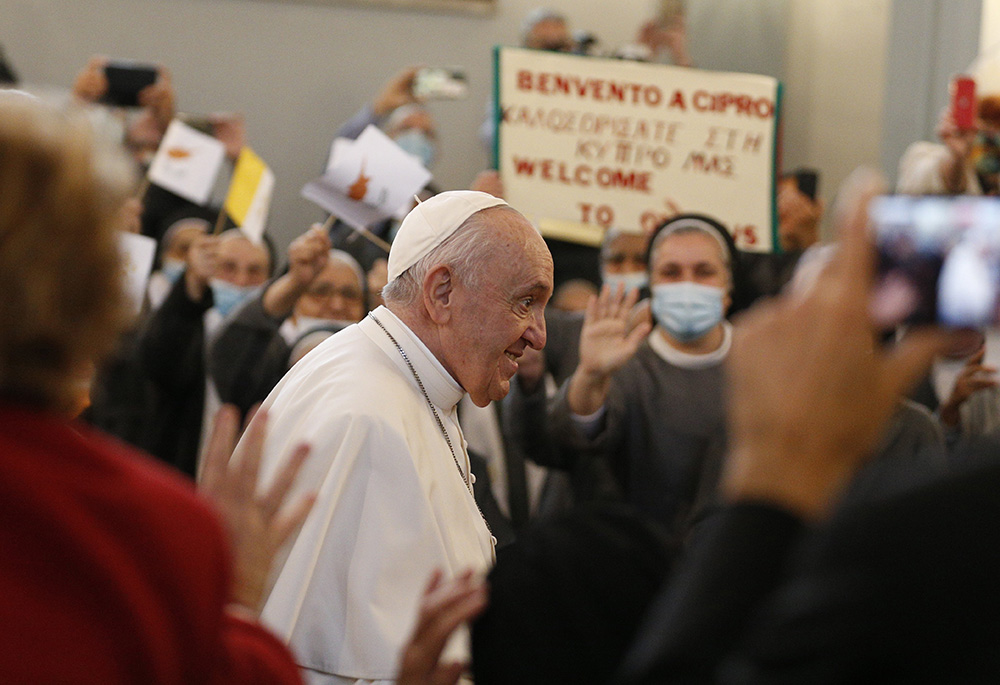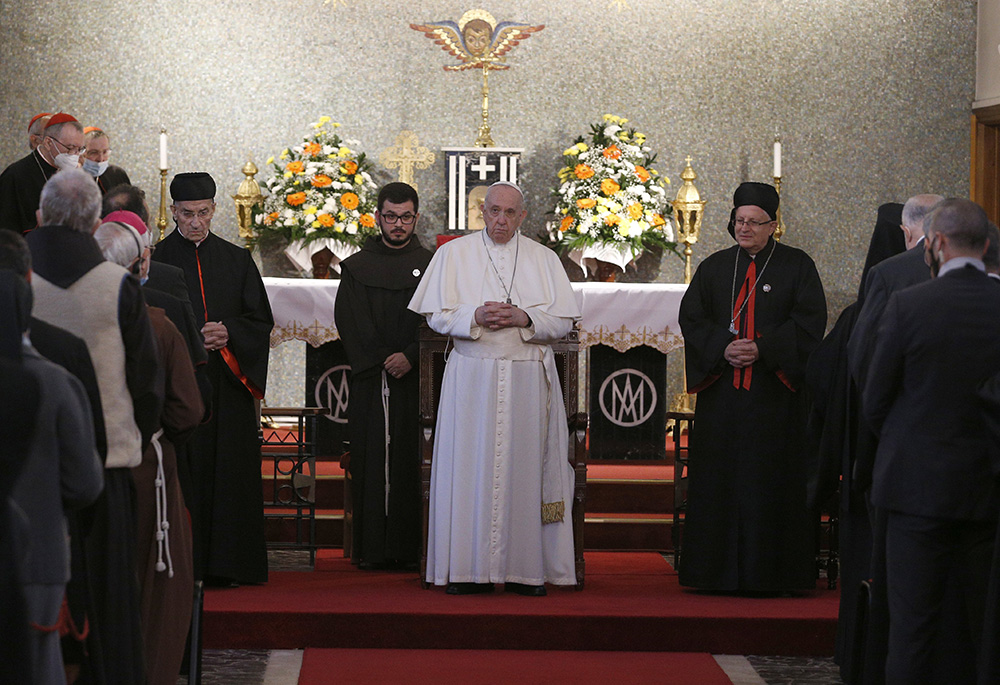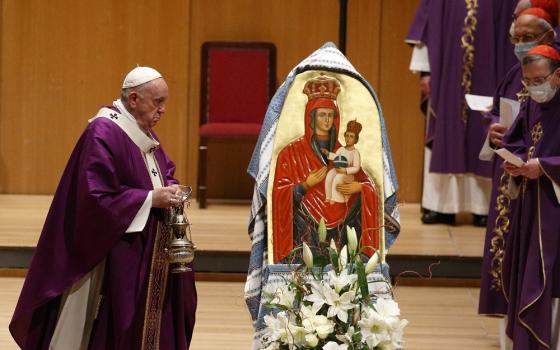
Pope Francis arrives to lead a meeting with priests, religious, deacons, catechists and members of church groups and movements at the Maronite Cathedral of Our Lady of Grace Dec. 2 in Nicosia, Cyprus. (CNS/Paul Haring)
Pope Francis pleaded for an end to "walls of fear" and "vetoes dictated by nationalist interests" on Dec. 2, as he arrived in the splintered eastern Mediterranean capital city of Nicosia — the last divided capital city in the world — kicking off a 5-day visit to Cyprus and Greece.
"Walls do not and should not exist in the Catholic Church," the pope said during his first stop in Nicosia's Maronite Catholic Cathedral of Our Lady of Grace, which is located along the United Nations patrolled "Green Line" that since 1974 has separated the contested northern Turkish region of the island from the Greek-inhabited southern territory.
"The church is a common home, a place of relationships and of coexistence in diversity," he said.
Francis' message of unity served a dual purpose: to address both the longstanding "Cyprus problem" between the island's Greek and Turkish Cypriots and to further relations between the country's minority Catholic population and their majority Orthodox Christian neighbors.
In two separate addresses to both religious and civil leaders on Thursday, Francis frequently turned to the theme of "dialogue" to offer a way forward.

Pope Francis leads a meeting with priests, religious, deacons, catechists and members of church groups and movements at the Maronite Cathedral of Our Lady of Grace Dec. 2 in Nicosia, Cyprus. (CNS/Paul Haring)
"Let us nurture hope by the power of gestures, rather than by gestures of power," he said at a welcome ceremony at the presidential palace. "There is a power of gestures, which prepares the way of peace. Not gestures of power, threats of reprisal and shows of force, but gestures of détente and concrete steps towards dialogue."
Referring to Cyprus as "a pearl of great price in the heart of the Mediterranean," Francis said that the formation of the jewel "takes time and patience."
"It demands a broad vision capable of embracing a variety of cultures and looking to the future with foresight," he said. "I think in this regard of the importance of protecting and supporting all the members of society, especially those who are statistically a minority."
But the patience that the pope urged is waning for those seeking reconciliation among the Turkish and Greek Cypriots. Over the last two decades, reunification efforts have been soundly rejected and experts believe the possibility seems even further away than when Pope Benedict XVI visited Cyprus in 2010.
During his remarks, the pope sought to emphasize the shared history of the island's inhabitants, saying it offers a "history of intertwined peoples, a mosaic of encounters."
"The church, as Catholic, universal, is an open space in which all are welcomed and gathered together by God's mercy and invitation to love," he said.
As he sought to emphasize the island's diversity, the pope elevated the issue of migration, noting that Cyprus now receives more asylum-seekers per capita than any other country in the European Union.
Caritas Cyprus Executive Director Elizabeth Kassinis told NCR that the island is "struggling with what to do with these increasing numbers," noting it is a drain on resources in a small society, with limited potential to create new opportunities for new arrivals.
Advertisement
Despite the challenges, Francis sought to offer a booster shot to church leaders on the front lines of the crisis, telling them "the work you are carrying out on this island, as you welcome new brothers and sisters arriving from other shores of the world, is precious."
"Foster a patient and attentive outlook, to be visible and credible signs of the patience of God, who never leaves anyone outside the home, bereft of his loving embrace," he continued.
Migration is expected to dominate the pope's messages throughout his time in both Cyprus and Greece.
Prior to departing for Cyprus on Dec. 2, the pope met with 12 refugees from Syria, Congo, Somalia and Afghanistan who came to Italy from Lesbos, a Greek island he visited in 2016 and where he is scheduled to visit again on Dec. 5.
The pope also visited the parish church of St. Mary of the Angels, near Rome's Fiumicino airport, where he met with and prayed together with 15 other refugees hosted by the church.
As he spoke to the country's Catholic leaders facing a divided country, a surging influx of migration and a complicated history with its Orthodox counterparts, Francis emphasized the need for a church marked by both "patience" and "fraternity."
Taking stock of the island's early history, visited by Sts. Paul and Barnabas during the first century, Francis said that Cyprus served as a "springboard" for Christianity in Europe.
The success of the early apostles, he argued, was marked by not overwhelming "the fragile faith of the newcomers by taking a rigorous and inflexible approach, or by making excessive demands about the observance of precepts."
A patient church, he said, "calmly welcomes newness and discerns situations in the light of the Gospel."
Be it newcomers to Cyprus or believers from "different rites and traditions," the pope said that Christians "should not experience diversity as a threat to identity."
"By your spirit of fraternity, you can remind everyone, and Europe as a whole, that we need to work together to build a future worthy of humanity," he concluded, "to overcome divisions, to break down walls, to dream and work for unity."
Following his time with both civil and church leaders, Francis headed to the country's apostolic nunciature, where he will stay both nights. It is located neither on the Turkish or Greek Cypriot side of Nicosia, but instead in the United Nations' controlled buffer zone between the two regions.





